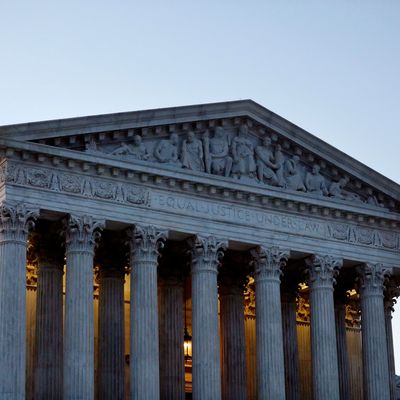
After months of promising, in all caps, that he’d see the challengers of his watered-down travel ban in court, Donald Trump has gotten his wish and gotten the Supreme Court to facilitate that encounter — by agreeing to hear his administration’s last-ditch appeal over the blocked executive order barring certain Muslim travelers and refugees from entering the country. The Court made the announcement Monday morning.
In a comprehensive order listing how the Court will proceed with the case, which includes separate challenges from Hawaii and Maryland, Trump also got a bit of a win: The justices allowed his administration to enforce the travel ban against pretty much anyone who is not tangibly affected by it. Or as the court put it, people who don’t “have a credible claim of a bona fide relationship with a person or entity in the United States.” That could include people from the six barred countries with pending visa applications that otherwise don’t have a nexus to the U.S. “All other foreign nationals are subject to the provisions” of the executive order, the Court said.
But that may not mean much after all. The vast majority of the millions ostensibly targeted by Trump’s actions — nationals from the Muslim-majority nations of Iran, Libya, Somalia, Sudan, Syria, and Yemen — have no intention of visiting us. And there are many who do have a connection to our country against whom the government cannot do a thing: international students, family members of U.S. citizens or permanent residents, specialized immigrant workers, refugees who are already in transit. The Supreme Court said any American entity with a connection to such a person would face “concrete hardship” if the administration’s hard-line stance is accepted.
With the legality of Trump’s travel ban now on the justices’ radar, the high Court may have to walk a fine line. On the one hand, it’ll have to settle whether the entry ban is lawful in the first place — either under the Constitution, federal law, or both. One federal appeals court in Virginia told Trump that his travel ban “drips with religious intolerance, animus, and discrimination” in violation of the First Amendment. Another one in California said that Trump exceeded his authority under existing immigration law.
Whichever way the Supreme Court chooses to go, it will have to determine if it wants to treat the former celebrity star and hotelier with the same deference owed past presidents — who historically have received a great deal of respect from courts in the national-security realm — or simply as an exception to the rule. That is, that he’s a president whose own lack of regard for his oath of office, his showmanship, and his incompetence in rolling out the travel ban simply leaves courts with no option but to second-guess his every move.
At least three of the conservatives on the Court suggested on Monday that Trump is deserving of that respect, known in the law as the “presumption of regularity.” Justice Clarence Thomas, joined by Justice Samuel Alito and their newest ally, Neil Gorsuch, wrote separately to note that they would’ve allowed the entire travel ban to take effect immediately. Which might have wrought some of the chaos we saw back in January when Trump haphazardly signed an early version of his executive order that even a bipartisan group of national-security experts found was harmful to national security.
But Thomas also seemed to complain that the majority of his colleagues, in trying to reach a sensible result by keeping the travel ban on ice in large part, went against “sound legal principles.” He wrote: “Today’s compromise will burden executive officials with the task of deciding — on peril of contempt — whether individuals from the six affected nations who wish to enter the United States have a sufficient connection to a person or entity in this country.”
Some have warned that whatever precedent the Supreme Court sets with these cases could very well hobble a future President Elizabeth Warren, or just about any other normal Republican president. Others have cautioned that judges have no business being a part of the #resistance. But the very fact that a key Trump policy is now before the nation’s highest court — and that his administration hasn’t tried to enforce it despite his Twitter tantrums — shows that America’s constitutional experiment is still working. When all is said and done, the Constitution may just survive this one.
The Supreme Court is expected to hear arguments in Trump v. International Refugee Assistance Project and Trump v. Hawaii in October. In the interim, don’t be surprised if this whole controversy goes away over the summer: At least one legal expert predicted the case may be moot before the justices reconvene for their new term.





























